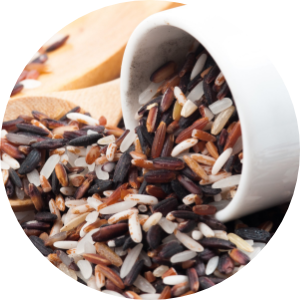 This article was verified for accuracy by Stephanie Wells, MS, RD, ACSM-CPT on March 23rd, 2023
This article was verified for accuracy by Stephanie Wells, MS, RD, ACSM-CPT on March 23rd, 2023
Rice is one of the most versatile foods in existence. Used in countless dishes and cuisines around the world, this commodity crop is abundant and affordable in nearly every region. Not only that, but it’s also a whole plant food that is minimally-processed and delivers various vitamins and minerals. One example of such would be fiber, and in this article we’ll be sorting through twelve different rice varieties to determine which rice is highest in fiber.
 Brown, Wild & BlackAs it turns out, the rice varieties with the most fiber include short grain brown rice, wild rice, and black rice– each of which contain 3 grams of fiber per quarter-cup dry serving. |
That said, the runner-ups are not far behind. Continue on to see how the rest stack up.
Rice Highest In Fiber
Fiber is a type of carbohydrate that comes with many health benefits. These include lowering cholesterol, maintaining bowel health, controlling blood sugar levels, and more. Depending on the type of rice you consume, fiber content can vary.
The table below compares the nutrition facts of 12 different varieties of rice. For the sake of consistency, data was recorded from a single supplier. The rice varieties are ranked by highest in fiber to lowest in fiber:
| Rank | Type Of Rice | Serving Size | Calories | Carbohydrates | Fiber |
| 1 |  Short Grain Brown | 1/4 Cup, dry | 150 | 35g | 3g |
| 2 |  Wild | 1/4 Cup, dry | 160 | 35g | 3g |
| 3 |  Black | 1/4 Cup, dry | 160 | 33g | 3g |
| 4 |  Long Grain Brown | 1/4 Cup, dry | 170 | 34g | 2g |
| 5 |  Brown Basmati | 1/4 Cup, dry | 160 | 33g | 2g |
| 6 |  Brown Jasmine | 1/4 Cup, dry | 160 | 33g | 2g |
| 7 |  Red Jasmine | 1/4 Cup, dry | 150 | 35g | 2g |
| 8 |  Long Grain White | 1/4 Cup, dry | 160 | 36g | 1g |
| 9 |  White Jasmine | 1/4 Cup, dry | 160 | 36g | 1g |
| 10 |  Arborio | 1/4 Cup, dry | 160 | 36g | 1g |
| 11 |  Sushi | 1/4 Cup, dry | 160 | 36g | 1g |
| 12 |  White Basmati | 1/4 Cup, dry | 160 | 36g | 0g |
Although it may not be as abundant a fiber source as beans, rice does contain some fiber. Amounts can vary by type, but the highest-fiber rice comes down to a three-way tie. Let’s examine.
1. Short Grain Brown Rice
Short grain brown rice is a type of rice that has not had its bran and germ removed like white varieties have. The short grain variety is starchier and has a stickier texture when cooked as opposed to long grain varieties which are drier and separate more easily.
Fiber recommendations can vary by gender and age, but the average is about 28 grams per day says the American Heart Association.
Just a single 1/4-cup dry serving of short grain brown rice contains 3 grams of fiber. While this may not be enough to fulfill your daily needs, a couple of servings could certainly help inch you closer to your goals.
Not only is short grain brown rice one of the highest in fiber, but it also has marginally fewer calories per serving than all of the other varieties except red jasmine, which contains the same amount.
2. Wild Rice
“Wild rice” refers to the harvestable grain of any of four grass species from the Zizania genus. It is a long-grain variety with a chewier texture than white rice and has a richer, nutty flavor.
The wild rice surveyed for this comparison contains 3 grams of fiber per 1/4-cup dry serving– just as much as short grain brown rice.
Wild rice requires a longer cooking time and the grains will triple in size once cooked. It can be used in most of the ways other types of rice are used, but it tends to be used most commonly in stuffing, rice pilaf, and as a side dish for salmon and chicken.
3. Black Rice
Also known as purple rice and forbidden rice, “black” rice refers to any range of rice type of the Oryza Sativa species. It gets its black color from its anthocyanin content– an antioxidant associated with various health benefits. According to Cleveland Clinic, these include lowering blood pressure, reducing risk of heart disease, and preventing neurological disease.
Black rice is revered for containing more nutrients than most other types of rice— one of which being fiber. In fact, it ties short grain brown rice and wild rice in fiber content, containing 3 grams per 1/4-cup dry serving.
Common ways in which black rice is consumed include:
- Added to salads
- Vegan burritos
- Alongside salmon
- And more
The Bottom Line
There’s no doubt that fiber is an important nutrient, and although rice may not be the most abundant source of it, certain varieties can help you reach your goals while providing additional health benefits to boot.

